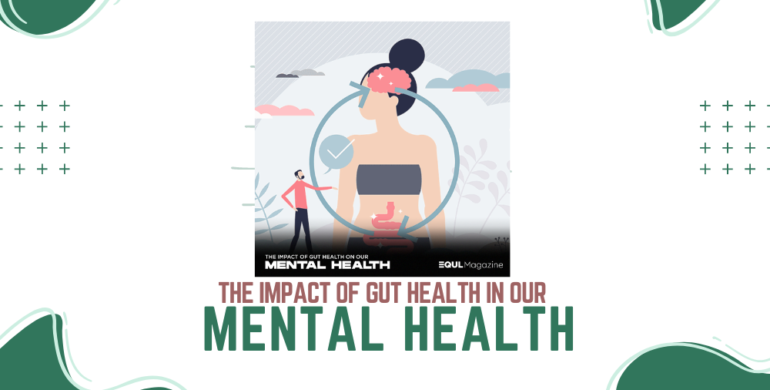The Impact Of Gut Health On Our Mental Health
“You are what you eat,” is more than just a phrase, in many ways.
But to understand the impact of gut health on our minds, we need to first understand the connection between the two.
Ever thought about the fact that when you get excited or nervous, you feel a certain fluttering feeling in your stomach?
Sometimes butterflies, sometimes a more sinking feeling.
This is actually a sensory presentation of the direct connection between the gut and the mind that we often experience in our day-to-day lives.
Let’s dig deeper (literally) shall we?
Did you know your gut is also known as your second brain?
Let me explain.
Most of us are aware of how the brain controls the body with a widespread nervous system to pick up signals, sending them to the brain, which then directs the action accordingly.
But are you also aware that each nerve at the cellular level is a tiny little brain itself, with the ability to understand, store information and process it at a cellular level?
Yup, this is a conservatory mechanism in our body to decrease the load on the brain.
Such a nervous system also exists around your gut, which is the second-largest nervous system after the brain. This system is called the enteric nervous system (ENS) which goes all the way from your esophagus to your rectum!
Yup, that’s how big it is– making it the second brain.
So what does the gut-brain do?
The gut-brain is responsible for regulating some of the important functions of our body, ie. the digestion of food, release of digestive enzymes in the tract, interaction with the gut microbes, blood circulation, absorption of nutrients and elimination of toxins. This meshwork of nerves in the gut is also in communication with various organs of the body.
All of this information collected from the body is sent back to the brain via the gut-brain axis.
The brain then regulates the release of necessary hormones into the bloodstream which brings about changes in your emotions & body functioning.
The important role of the gut microbes
Your gut contains a rich amount of good bacteria which helps in the breaking down and metabolism of food.
The gut microbes also provide major information about the food ingested by the ENS by breaking down the food and making neurotransmitters (chemicals) like Serotonin, GABA etc. These neurotransmitters play a major role in regulating your mood.
Thereby, gut microbes play a very important role in affecting your mood.
Fun fact: A large proportion of serotonin a.k.a happy hormones is produced in the gut. Now we know why the moment we eat our favorite food, we feel great…because there is an instant release of serotonin that takes place!
This means, that an unhealthy diet leads to unhealthy microbes causing inflammation in the gut.
Inflammation in the gut (digestive tract) leads to the thinning of its walls that release bacteria into the bloodstream, causing a systemic infection.
This can cause inflammation in the brain as well, leading to neurological, psychological or psychiatric issues.
Similarly, when your mind is stressed, it elicits a stress response in which the major blood supply is shifted to the limbs and not the gut and various organs of the body.
This is part of our fight or flight response programmed in us.
Therefore, a chronically stressed individual will have less circulation going to the gut and the organs, thereby affecting their functioning, leading to inflammation and illness.
So basically, your gut tells your brain that there is something good or bad inside your body. With the help of the nervous system & gut microbes, the food is assessed and hormones are released accordingly.
Consequently, healthy food releases healthy hormones in your body, leading to a better mood and better functioning of the body organs & systems.
Unhealthy food and stress often lead to inflammation of the gut, which in turn leads to a decrease in happy hormones and an increase of inflammatory ones, which can cause both mental & physical illness.
Many studies in the past have proved that illnesses like depression and anxiety contribute to various gut-related illnesses like irritable bowel syndrome, constipation, diarrhea and even bloating.
This is of course, true, but recent studies have proven that the reverse is true, too!
Yes, gut-related illnesses can in fact lead to poor mental health.
Some ways to improve your gut health:
1. Eat more heavy fiber foods. Whole grains, fresh vegetables, beans and legumes, and a variety of fresh fruits serve as nutrition for the bacteria in our gut.
2. Limit your sugar intake. Excessive sugar encourages inflammation and also yeast growth which can throw off the gut balance.
3. Dental hygiene also plays quite an important role. Studies have shown that bacteria from your mouth can get into your system and cause harm.
4. Eat more fermented food. This food has more good bacteria to improve your gut. Eg. Plain yogurt, kimchi, kombucha.
5. Food rich in polyphenols. Polyphenols act as anti-inflammatory substances and also act as fuel for gut bacteria. This includes yummy stuff like dark chocolate, almonds, green tea, onions and blueberries.
6. Spices like garlic, turmeric, ginger added to your food, help in getting rid of harmful bacteria.
7. Reduce artificial sweeteners. Recent studies have observed poor gut health with artificial sweeteners.
Be mindful of what goes into your body because it not only affects your body but your mind as well.
Take care of both your mind & body. Because actually speaking, that is the only natural resource that you have and will always have.
And well, the truth is, you are, in fact, what you eat.
There are no comments










